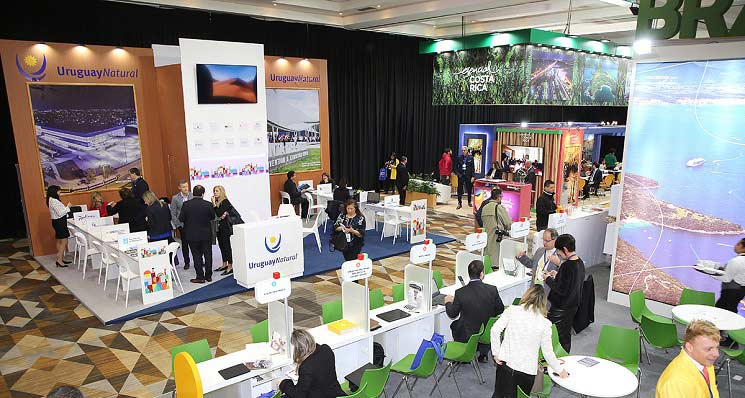UFI, the Global Association for the Exhibition Industry, has released the latest edition of its flagship Global Barometer research, which takes the pulse of the industry. One of the key findings is a weaker first half of 2019 in terms of revenue growth compared to 2018, but there is still an overall positive trend for the year in relation to revenue.
With regard to operating profit, 80 percent of companies maintained a good level of performance in 2018, and more than 40 percent of companies from all regions declared an increase of more than 10 percent compared to 2017. However, the prospects for 2019 are currently lower globally, in line with the worldwide slowdown of economic growth.
Results also indicate that the top business issue within the industry remains the “State of the national/regional economy” (selected by 24 percent of all respondents), ahead of “Competition within the industry” and “Global economic developments” (each selected by 19 percent). The barometer also includes a section on the state of digital conversion within the industry. The results show a “Digitization Implementation Index” of 27, indicating that the commitment towards digitization is not wholly spread.
“Exhibitions mirror markets–therefore a slowdown in global economic growth also affects the exhibition industry, as this latest edition of our UFI Global Barometer shows,” says Kai Hattendorf, UFI managing director and CEO. “But the data also proves that exhibitions are not just resilient, but show a consistently strong performance and growth opportunities in many core markets around the world.”
Size and scope
This latest edition of UFI’s bi-annual industry survey was concluded in July 2019 and includes data from a record 322 companies in 57 countries and regions.
The study delivers outlooks and analysis for 16 countries and regions: Argentina (for the first time), Australia, Brazil, China, Germany, India, Indonesia, Italy, Japan, Macau, Mexico, Russia, South Africa, Thailand, the UK and the US. In addition, four aggregated regional zones have been analyzed.
Economic developments
While a majority of companies in all regions – with the exception of Middle East/Africa – expect an increase in gross turnover for the two halves of 2019 and the first half of 2020, the first half of 2019 appears to be weaker compared to recent years. However, current forecasts for the second half of 2019 and the first half of 2020 show a return to robust levels.
Eight of the surveyed countries and regions have, for all three periods surveyed, a majority of companies declaring turnover increases. These are Australia, Brazil, Italy, Japan, South Africa, Thailand, the UK and the US. For the second half of 2019 and the first half of 2020, this is also the case for India, Indonesia, Germany, Macau and Russia.
In terms of operating profit, 80 percent of companies maintained a good level of performance in 2018, with around 40-50 percent declaring an increase of more than 10 percent compared to 2017. The highest proportion of companies declaring such an increase in 2018 are located in Brazil, Germany, Italy, Mexico, the UK and the US. For 2019, only Europe has, on average, a higher proportion of companies expecting an increase of more than 10 percent of their operating profit compared to 2018. In all other regions, the share of companies projecting this decreases from 2018 to 2019. The highest proportions of companies declaring such an increase in 2018 are located in Russia (71 percent), the UK (55 percent), India (53 percent) and the US (45 percent).
Top business issues
When asked about the most important issues for their business in the coming year, companies remain concerned about the following four topics: “State of the economy in home market” (24 percent in the current survey, down 1 percent compared to six months ago), “Competition within the industry” (19 percent, unchanged), “Global economic developments” (19 percent, down 1 percent) and “Internal challenges” (16 percent, up 1 percent).
Digitization
Results show that the majority of companies are responding to the accelerating process of digitisation within the exhibition industry. The “Digitization Implementation Index”, which measures progress towards a state of “full digitization”, is at 27 globally. China, Germany, India, Indonesia, Italy, Mexico, the UK and the US are identified as the exhibition markets that are currently most advanced in terms of digital transformation.
Background
The 23rd Global Barometer survey, conducted in June and July 2019, provides insights from 322 companies in 57 countries and regions. It was conducted in collaboration with 14 UFI associations: AAXO (The Association of African Exhibition Organizers) and EXSA (Exhibition and Events Association of Southern Africa) in South Africa, AEO (Association of Event Organisers) in the UK, AFIDA (Asociación Internacional de Ferias de América) representing Central and South America, AMPROFEC (Asociación Mexicana de Profesionales de Ferias y Exposiciones y Convenciones) in Mexico, EEAA (The Exhibition and Event Association of Australasia) in Australia, IECA (Indonesia Exhibition Companies Association) in Indonesia, IEIA (Indian Exhibition Industry Association) in India, JEXA (Japan Exhibition Association) in Japan, MFTA (Macau Fair Trade Association) in Macau, RUEF (The Russian Union of Exhibitions and Fairs) in Russia, SISO (Society of Independent Show Organizers) in the US, TEA (Thai Exhibition Association) in Thailand and UBRAFE (União Brasileira dos Promotores Feiras) in Brazil.
“In-depth research of this kind is the result of a trusted collaboration in the global UFI community,” says Christian Druart, UFI research manager and secretary of the UFI Associations’ Committee. “This has allowed us to grow the number of market profiles even further, and we are pleased to welcome RUEF – The Russian Union of Exhibitions and Fairs – to the network participating in the barometer.”
In line with UFI’s objective to provide vital data and best practices to the entire exhibition industry, the full results can be downloaded at www.ufi.org/research. The next UFI Global Barometer survey will be conducted in December 2019.
































